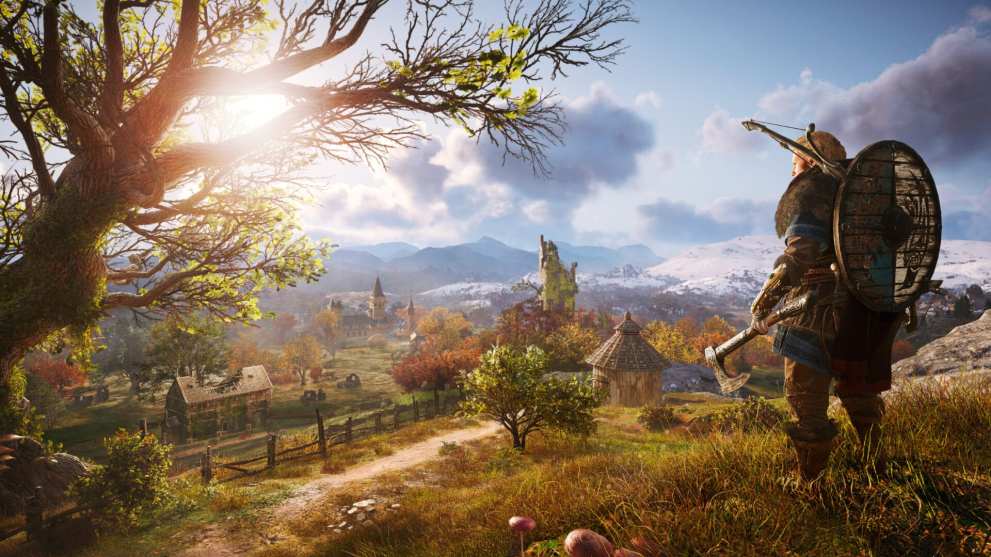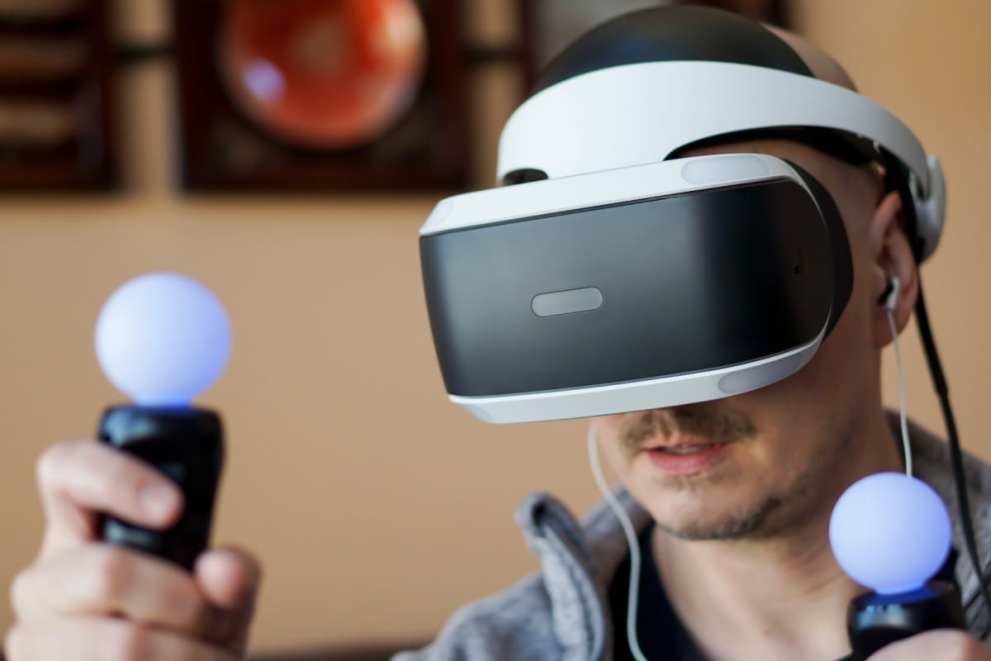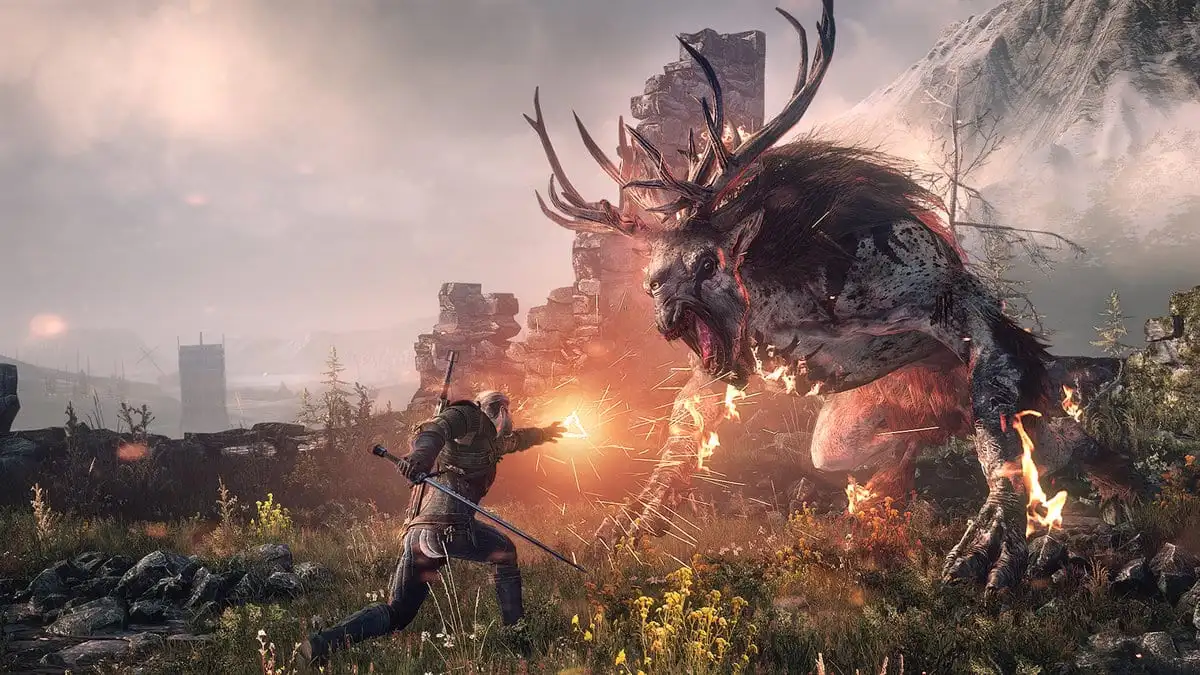Video Game Franchise Winner: Assassin’s Creed

The video game industry has largely been built on sequels, but there are few IPs as longstanding as Assassin’s Creed. Fewer still have evolved and reinvented themselves with quite the same degree of success in the process.
It was an initiative that was forced on Ubisoft after years of repeating the same blueprint year after year that seemed to tire its fans out. That and the wonky launch of Assassin’s Creed Unity saw interest in the series reach an all-time low by the time Syndicate launched in 2015.
Fast forward two years to the launch of Origins and the entire focus of Ubisoft’s game design for Assassin’s Creed had shifted. From action game to action-role-playing game, and largely dumping the convoluted lore of the series’ modern-day storyline, Origins felt like a reset button.
And what a massive success the series has been ever since, attracting all-new audiences of players who revel in its new progression mechanics, deeper customization options, and even larger and content-rich open-worlds.
Odyssey, and now more recently Valhalla, have built on those improvements, refining the experience into an epic RPG experience that stands toe-toe with the genre’s best games.
Now, regardless of whether you think any of the three modern Assassin’s Creed games top the likes of Black Flag (ever the go-to answer of which game is best in the series according to purists) or not, it would be hard to deny they aren’t at least in the discussion.
Odyssey proved that Origins could get better, and Valhalla has now hit the mark again; overall, the series’ stock feels as though it’s never been higher.
Video Game Franchise Loser: Mass Effect

Once an industry darling lauded as the benchmark for quality storytelling in the RPG genre, the Mass Effect franchise endured a torrid eighth console generation.
Just one title, Andromeda, has released since the conclusion of the original trilogy back in 2012, and it was widely panned for woeful technical performance and a story that pales in comparison to previous efforts.
It’s only now, three years after that fiasco, BioWare has officially confirmed a new Mass Effect project is in the works. This after the developers had previously confirmed the series was “on ice” while it prepared to launch its MMORPG Anthem. Remember how that one turned out?
It’s fair to say BioWare’s handling of both Andromeda and Anthem has rather sullied its once stellar reputation and likely has fans feeling a little trepidation about Mass Effect’s prospects moving forward.
Surely, the studio has the talent to produce another RPG gem. The question is whether its management is capable of handling the simultaneous development of new Mass Effect and Dragon Age games, as well as reworking Anthem all at the same time…
Video Game Technology Winner: VR

VR used to be the stuff of sci-fi television shows, but over the past console generation, it’s finally arrived as a viable technology.
Sure, it hasn’t reached Star Trek levels of immersion quite yet, but we’ve come a long way since the Virtual Boy of the 1990s. Superb games like Beat Saber and Half Lyfe: Alyx that take full advantage of the technology’s best attributes are finally beginning to show what the platform can really do.
Although in truth, VR is still finding its feet as a growing segment in a very competitive industry. While the arrival of affordable headsets like PSVR has made the platform accessible, we’re still waiting for a watershed moment that truly brings it to the masses.
But there’s no doubt that in the years to come we’ll look back at the eighth console generation as the era in which VR debuted properly as a new gaming platform. That or we’ll be including it in lists like this one ten years from now under the “loser” section after it completely failed to gain the sort of traction we’re expecting it to now!
In all seriousness, though, between the launch of cheaper headsets and quality games like Half-Life: Alyx, VR’s future looks bright and its longevity assured.
Video Game Technology Loser: Gesture Controls

Believe it or not, gesture controls were once shaping up as a defining feature of future video game technology. Yet, fast forward 20 years and many game enthusiasts won’t even have heard of an Xbox Kinect, let alone see one in the wild.
The infamous peripheral device of which Microsoft was once so proud had an initially blistering start to life way back in 2010.
After selling eight million units in its first two months on the market, Kinect had earned a spot in Guinness’s book of records for the fastest-selling consumer technology.
Soon after, though, and Kinect’s momentum slowed considerably. The software simply wasn’t there to make use of it, and developers seemingly weren’t interested in supporting it.
To rescue the situation, Microsoft opted to pair it with Xbox One as a pack-in extra, raising the console’s price to over $100 more expensive than rivals PS4 and Wii U but making it otherwise cheaper than it was to purchase as a standalone.
Unfortunately for Microsoft, it proved a disastrous move, one which contributed to the Xbox One’s poor commercial performance in comparison to its main rival PS4.
Even beyond the irritation of having to pay more for Xbox One as a result of Kinect’s inclusion, the device was loathed largely because it didn’t really add to the “next-generation” console experience.
Users quickly discovered that gesture controls aren’t particularly accurate, convenient, or necessary at all in place of more tactile and simpler conventional controls.
Video Game Developer/Publisher Winner: CD Projekt Red

Even those with only a passing interest in video games are unlikely not to have heard of The Witcher in some form or another. The franchise has become incredibly popular over the past five years thanks in large part to the success of Polish developer CD Projekt’s incredible The Witcher 3: Wild Hunt.
The series’ third game and its DLC expansions are something special.
At the time of launch, it wasn’t just way beyond anything the studio had created before, it was widely considered superior to pretty much any open-world RPG up until that point.
For many, in fact, The Witcher 3: Wild Hunt is still the high watermark for an entire genre, eclipsing beloved games from franchises like The Elder Scrolls and Dragon Age, the likes of which are from much larger and more established developers.
The praise and admiration CD Projekt Red has earned in a relatively short space of time has been impressive, something only intensified by its commitment to support the game with free content packs and robust expansions.
That decision has helped elevate the studio to somewhat of an industry golden child of which much is expected moving forward.
And that brings us to Cyberpunk 2077, the studio’s next major project which has been in the works for the better part of a decade and is now finally due to launch in just a matter of weeks.
Its critical success would surely cement CD Projekt Red’s legacy as a developer, but the company has already emerged as a big winner of this past console generation.
Video Game Developer/Publisher Loser: Konami

Few developers have fallen from grace in such dramatic fashion as Konami this past console generation.
Ten years ago the company was a major industry player, commanding a huge number of established and seemingly valuable IPs as it produced dozens of games across every platform.
Today, though, Konami is a shell of that former self with only a lukewarm interest in its video gaming segment — certainly the AAA aspect of it, anyway.
As Konami waved goodbye to serious game development outside of consistent commercial performers like Pro Evolution Soccer, so too did fans bid farewell to great franchises like Castlevania and Silent Hill.
Metal Gear Solid, too, of course, a franchise that hasn’t received a game since the controversial and decidedly mediocre Metal Gear Survive, a zombie spin-off that wasn’t received well by fans and didn’t help Konami’s reputation. Particularly so, given that the fiasco surrounding director Hideo Kojima’s very public falling out with the company.
Moving forward, it seems highly unlikely we’ll ever see Konami return to the mainstream gaming space, making for a rather sad end to a once well-reputed video game developer.
Video Game Genre Winner: Live Service Multiplayer Games

A big takeaway from this past console generation has been the shift in release strategy from several major game developers/publishers. While the practice has been commonplace in the MMORPG scene for years, a similar model has now made its way to other mainstream genres.
Games are now increasingly released as more of a foundational package rather than a complete product as in-game monetization fuels the continued support of the product with a drip-feed of new content.
It’s a practice that has sometimes caused controversy –think No Man’s Sky and Sea of Thieves–, and even proved disastrous in the unfortunate case of games like Anthem. But it’s also proved incredibly effective in others.
Destiny, for example, was the first premium game to really find success delivering on a long term promise of continued content for a console title (not including subscription MMOs).
More recently, Fortnite has taken the concept to new levels with an almost exhausting amount of new content arriving week in, week out for millions of active players. Its success has spawned dozens of copycats, all launching with the same promise of continued content moving forward.
Certainly, it’s likely to see this practice continue as a winning formula during this new console generation, especially as the free-to-play model becomes ever-more popular. Although, it will be interesting to see how the approach changes after the high-profile failures of games like Anthem and in all likelihood Marvel’s Avengers.
Video Game Genre Loser: Immersive Sims

Immersive sims were a big deal during the late 1990s and early 2000s.
Series like System Shock, Deux Ex, and later BioShock were are all lauded for their inventive gameplay mechanics and intriguing worlds, and it was a perceived enthusiasm for that content which later paved the way for games like Dishonored, Prey, and the rebooted Deus Ex series.
But in virtually every case, the story has played out the same: immersive games play brilliantly and review well, but nobody seems to buy them.
One after another the franchises have fallen by the wayside as sequels have failed to live up to commercial expectations. And now we’re left with essentially nothing…
Whether we’ll ever see the return of these mechanically complex FPS experiences to the mainstream might very well depend on the success of former BioShock director and creator Ken Levine’s long-in-development next game, as well as that of 2K’s recently announced BioShock 4 without him.
Maybe then I’ll get that Mankind Divided sequel I long for so desperately!




